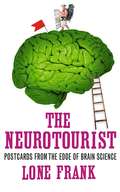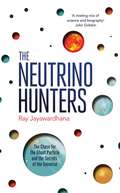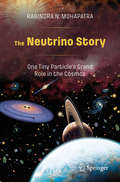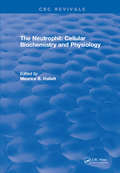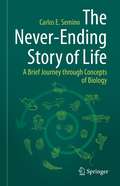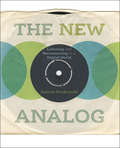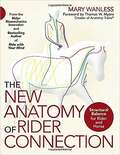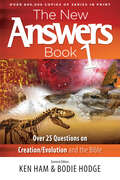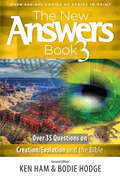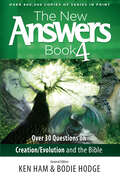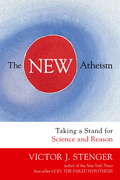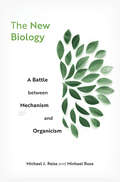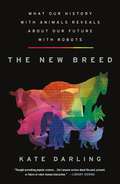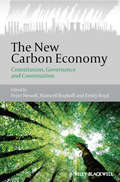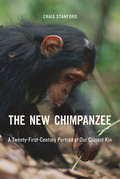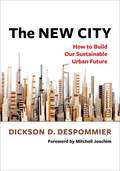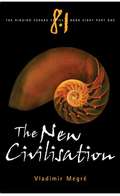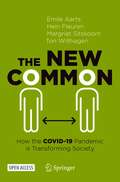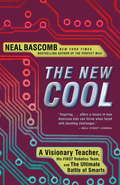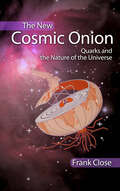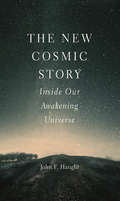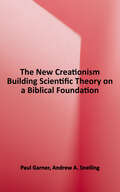- Table View
- List View
The Neurotourist: Postcards from the Edge of Brain Science
by Lone FrankDiscover the true heart of humanity: the brain Your brain shapes your world, but you can also shape your brain. From the God helmet to the No Lie MRI, award-winning journalist Lone Frank embarks on an incredible adventure to the frontiers of neuroscience, revealing how today's top scientists are reinventing human nature, morality, happiness, health, and reality itself. Interlacing bizarre experiments, cutting-edge research, and irreverent interviews, The Neurotourist is an unforgettable tour of the mind-bending revolution underway in the new age of the brain. A critically-acclaimed journalist, science writer, and TV presenter, Lone Frank also holds a PhD in neurobiology and has worked as a research scientist in Denmark and the US. Apart from a particularly 'cute' corpus callosum she has an expert's word that her brain is quite unremarkable. "[A] fascinating exploration of the most intriguing brain experiments so far this century." The New Scientist
The Neutrino Hunters: The Chase for the Ghost Particle and the Secrets of the Universe
by Ray JayawardhanaBefore the Higgs boson, there was a maddening search for another particle - the ghostly neutrino. First detected in 1956, its fleeting appearances have teased answers to many mysteries: How did the Big Bang happen? Why is antimatter so rare? What might dark matter be made of? And could faster-than-light travel be possible, overturning Einstein's theory of special relativity? But the quest for the neutrino also encompasses adventure, from Cold War defections and extra dimensions to mile-deep holes in the Antarctic ice and a troubled genius who disappeared without a trace. With The Neutrino Hunters, renowned astrophysicist Ray Jayawardhana delivers a thrilling detective story of revolutionary science.
The Neutrino Story: One Tiny Particle’s Grand Role in the Cosmos
by Rabindra N. MohapatraEvery second of every day, we are exposed to billions of neutrinos emitted by the Sun, and yet they seem to pass straight through us with no apparent effect at all. Tiny and weakly interacting this subatomic particle may be, but this book will show you just how crucial a role it has played in the evolution of the elements in the universe, and eventually, ourselves.We first start with an introduction to the basics of subatomic physics, including brief backgrounds on the discoveries that set the stage for major 20th century advances. The author, a distinguished theoretical physicist who has researched neutrinos for over thirty years, next explains in nontechnical language how and why the neutrino fits into the wider story of elementary particles. Finally, the reader will learn about the latest discoveries in the past half century of neutrino studies. This semi-popular science book will appeal to any physics students or non-specialist physicists who wish to know more about the neutrino and its role in the evolution of our universe.
The Neutrophil: Cellular Biochemistry and Physiology
by Maurice B. HallettA synthesis and collation of the recent material regarding the role of the neutrophil in basic pathological processes is presented in this volume. The mechanisms of chemotaxis, secretion, phagocytosis, intracellular killing, oxygen radical production and arachidonate production are comprehensively reviewed. Stimulus response coupling in the neutrophil, with chapters on intracellular Ca2+, C-Kinase, phospholipid metabolism, microfilaments and membrane electrophysiology are extensively discussed. Each chapter provides a critical review by experts with over 1,000 cited references. Invaluable to graduate students and medical and scientific researchers, this book provides a unique, up-to-date account of cellular biochemistry and physiology of the neutrophil.
The Never-Ending Story of Life: A Brief Journey through Concepts of Biology
by Carlos E. SeminoFor humankind, the most irreducible idea is the concept of life itself. In order to understand that life is essentially an infinite process, transmitted from generation to generation, this book takes the reader on a fascinating journey that unravels one of our greatest mysteries. It begins with the premise that life is a fact—that it is everywhere; that it takes infinite forms; and, most importantly, that it is intrinsically self-perpetuating. Rather than exploring how the first living forms emerged in our universe, the book begins with our first primordial ancestor cell and tells the story of life—how it began, when that first cell diversified into many other cell types and organisms, and how it has continued until the present day. On this journey, the author covers the fundaments of biology such as cell division, diversity, regeneration, repair and death. The rather fictional epilogue even goes one step further and discusses ways how to literally escape the problem of limited recourse and distribution on our planet by looking at life outside the solar system. This book is designed to explain complex ideas in biology simply, but not simplistically, with a special emphasis on plain and accessible language as well as a wealth of hand-drawn illustrations. Thus, it is suitable not only for students seeking for an introduction into biological concepts and terminology, but for everyone with an interest in the fundamentals of life at the crossroad of evolutionary and cell biology.
The New Analog: Listening and Reconnecting in a Digital World
by Damon KrukowskiAn NPR Best Book of the Year: &“A pointedly passionate look at what&’s been lost in the digital era.&” —Los Angeles Times A longtime musician and former member of the indie band Galaxie 500 who has also taught at Harvard, Damon Krukowski has watched cultural life lurch from analog to digital. And as an artist who has weathered that transition, he has challenging, urgent questions for both creators and consumers about what we have thrown away in the process: Are our devices leaving us lost in our own headspace even as they pinpoint our location? Does the long reach of digital communication come at the sacrifice of our ability to gauge social distance? Does streaming media discourage us from listening closely? Are we hearing each other fully in this new environment? Rather than simply rejecting the digital disruption of cultural life, Krukowski uses the sound engineer&’s distinction of signal and noise to reexamine what we have lost as a technological culture, looking carefully at what was valuable in the analog realm so we can hold on to it. Taking a set of experiences from the production and consumption of music that have changed since the analog era—the disorientation of headphones, flattening of the voice, silence of media, loudness of mastering, and manipulation of time—as a basis for a broader exploration of contemporary culture, Krukowski gives us a brilliant meditation and guide to keeping our heads amid the digital flux. Think of it as plugging in without tuning out. &“This is not a book about why vinyl sounds better; it&’s way more interesting than that . . . [It] is full of things I didn&’t know, like why people yell into cellphones . . . Ultimately, it&’s about how we consume sound as a society—which is, increasingly, on an individual basis.&” —NPR &“If you&’re a devoted music fan who&’s dubious about both rosy nostalgia and futuristic utopianism, Damon Krukowski&’s The New Analog is for you.&” —The New York Times Book Review
The New Anatomy Of Rider Connection: Structural Balance For Rider And Horse
by Thomas W. Myers Mary WanlessFor the past 30-plus years, Mary Wanless and her bestselling Ride with Your Mind books and DVDs have helped revolutionize the art and science of riding horses. Now she takes her pioneering techniques—which combine a lifetime’s influences from the fields of psychology, biofeedback, neuro-linguistic programming, the Alexander and Feldenkrais techniques, Tai Chi, massage, dance, anatomy, sports psychology, and educational kinesiology—to a whole new level. In her newest book, Wanless teams up with Anatomy Trains® creator and author Thomas Myers to examine how the “fabric” of our bodies (fascia) can potentially allow us to generate both stability and what so many riders find elusive even after years in the saddle—“feel.” Recent research shows how the body-wide “net” of fascia that both wraps each muscle and connects your skin to your bones can be the source of postural imbalances and the resulting restrictions in your movement. Wanless posits that the difference between “average” and “elite” riders lies in the quality of connection and awareness within this fascial net, and she gives us the means to take practical and meaningful steps toward addressing such issues, resulting in extraordinary change in the way we look and feel on horseback.
The New Answers Book Volume 1: Over 25 Questions on Creation/Evolution and the Bible (New Answers Books #1)
by Ken HamEvolution...intelligent design...creation...or a little of all three? What do you really believe - and why does it matter to your life, your family, and your faith today? Christians live in a culture with more questions than ever - questions that affect one's acceptance of the Bible as authoritative and trustworthy. Now, discover easy-to-understand answers that reach core truths of the Christian faith and apply the biblical worldview to these subjects: Genesis the Days of Creation millions of years evolution dinosaurs carbon dating UFOs death & suffering Noah's Ark and Flood fossils starlight and time ...and much more. Explore these and other topics, answered biblically and logically in this book from the world's largest apologetics ministry, Answers in Genesis. Timely and scientifically solid, The New Answers Book offers concise answers from leading creationist Ken Ham and scientists such as Dr. David Menton, Dr. Georgia Purdom, Dr. Andrew Snelling, Dr. Jason Lisle, and many more.
The New Answers Book Volume 2: Over 30 Questions on Creation/Evolution and the Bible (New Answers Books #2)
by Ken HamWhat happens when you have more "hot" questions on the Bible and creationism than you can answer in one book? You create a second volume! The New Answers Book 2 explores over 30 exciting and faith-affirming topics, including: The fall of Lucifer and the origin of evil When does life begin (and why does it matter)? Is evolution a religion (and why should I care)? Archaeology, Egyptian Chronology, and the great flood Could early biblical figures like Noah really live to over 900 years of age? What was the Star of Bethlehem (and how did the wise men follow it)? The "Evolutionization" of our culture — including intelligent design, gay marriage, Hollywood movies, and more! Explore these and other topics, answered biblically and logically in this book from the world’s largest apologetics ministry, Answers in Genesis. Contributors include Ken Ham, Dr. Andrew Snelling, Dr. Jason Lisle, Dr. Elizabeth Mitchell, Dr. Danny Faulkner, Mike Riddle, and more.
The New Answers Book Volume 3: Over 35 Questions on Creation/Evolution and the Bible (New Answers Books #3)
by Ken HamThe world around us provides irrefutable evidence of our Creator, but when challenged, can you defend your faith? Do you have answers to your own questions or those of your family about faith, evolution, creation, and a biblical worldview? Get the important information you need in this compelling third book from the popular Answers series, and learn more about: Global warming Cloning and stem cells The existence of God Bacteria and viruses Questions for evolutionists Human and chimp DNA The universe - young or old? "Kinds" in Genesis What Noah's Ark looked like...and much more. Learn how to be more effective in defense of scriptural authority and the truth of Genesis as literal history. Join Ken Ham and leading creation scientists like Dr. Jason Lisle, Dr. Andrew Snelling, Dr. Georgia Purdom, Dr. David Menton, Dr. Terry Mortenson, Dr. John Morris, Dr. Steve Austin, Dr. David DeWitt, Dr. Danny Faulkner, Dr. Joe Francis, and others as they provide simple and empowering answers to these and other popular questions of faith in our culture today. Other exciting books available in this best-selling series: The New Answers Book 1, and The New Answers Book 2, with over 50 additional questions and answers.
The New Answers Book Volume 4: Over 30 Questions on Creation/Evolution and the Bible (New Answers Books #4)
by Ken HamWhat about climate change? Is there a connection between dragon legends and dinosaurs? Is evolution the bloodiest religion ever? What about cavemen? What are the 10 best evidences for a young creation? The Answers series has been a powerful tool in equipping believers to share and defend their faith. Now the newest book in this landmark series takes on hot button topics like climate change, ancient man, and many more. Too many people have walked away from their faith because they sought answers for what seemed a contradiction in Christian belief and scientific teaching. For those who desire a deeper walk and a thriving faith in the face of a growing cultural adversity, now find the answers to questions you have or others may use to genetic engineering, this powerful team of apologists is able to inspire you and those you know who may not yet believe.
The New Anti-Aging Revolution
by Ronald Klatz Robert GoldmanThis book details a program to significantly slow the biological aging process by using diet, exercise, hormonal supplements, etc.
The New Atheism
by Victor J. StengerIn recent years a number of bestselling books have forcefully argued that belief in God can no longer be defended on rational or empirical grounds, and that the scientific worldview has rendered obsolete the traditional beliefs held by Christianity, Judaism, and Islam. The authors of these books--Richard Dawkins, Daniel Dennett, Sam Harris, Christopher Hitchens, and Victor J. Stenger--have come to be known as the "New Atheists." Predictably, their works have been controversial and attracted a good deal of critical reaction. In this new book, Victor J. Stenger, whose God: The Failed Hypothesis was on the New York Times bestseller list in 2007, reviews and expands upon the principles of New Atheism and answers many of its critics. He demonstrates in detail that naturalism--the view that all of reality is reducible to matter and nothing else--is sufficient to explain everything we observe in the universe, from the most distant galaxies to the inner workings of the brain that result in the phenomenon of mind. Stenger disputes the claim of many critics that the question of whether God exists is beyond the ken of science. On the contrary, he argues that absence of evidence for God is, indeed, evidence of absence when the evidence should be there and is not. Turning from scientific to historical evidence, Stenger then points out the many examples of evil perpetrated in the name of religion. He also notes that the Bible, which is still taken to be divine revelation by millions, fails as a basis for morality and is unable to account for the problem of unnecessary suffering throughout the world. Finally, he discusses the teachings of ancient nontheist sages such as Buddha, Lao Tzu, and Confucius, whose guidelines for coping with the problems of life and death did not depend upon a supernatural metaphysics. Stenger argues that this "way of nature" is far superior to the traditional supernatural monotheisms, which history shows can lead to a host of evils. The New Atheism is a well-argued defense of the atheist position and a strong rebuttal of its critics.
The New Biology: A Battle between Mechanism and Organicism
by Michael Ruse Michael J. ReissIn this accessible analysis, a philosopher and a science educator look at biological theory and society through a synthesis of mechanistic and organicist points of view to best understand the complexity of life and biological systems.The search for a unified framework for biology is as old as Plato’s musings on natural order, which suggested that the universe itself is alive. But in the twentieth century, under the influence of genetics and microbiology, such organicist positions were largely set aside in favor of mechanical reductionism, by which life is explained by the movement of its parts. But can organisms truly be understood in mechanical terms, or do we need to view life from the perspective of whole organisms to make sense of biological complexity?The New Biology argues for the validity of holistic treatments from the perspectives of philosophy, history, and biology and outlines the largely unrecognized undercurrent of organicism that has persisted. Mechanistic biology has been invaluable in understanding a range of biological issues, but Michael Reiss and Michael Ruse contend that reductionism alone cannot answer all our questions about life. Whether we are considering human health, ecology, or the relationship between sex and gender, we need to draw from both organicist and mechanistic frameworks.It’s not always a matter of combining organicist and mechanistic perspectives, Reiss and Ruse argue. There is scope for a range of ways of understanding the complexity of life and biological systems. Organicist and mechanistic approaches are not simply hypotheses to be confirmed or refuted, but rather operate as metaphors for describing a universe of sublime intricacy.
The New Breed: What Our History with Animals Reveals about Our Future with Robots
by Kate DarlingFor readers of The Second Machine Age or The Soul of an Octopus, a bold, exciting exploration of how building diverse kinds of relationships with robots—inspired by how we interact with animals—could be the key to making our future with robotic technology work.There has been a lot of ink devoted to discussions of how robots will replace us and take our jobs. But MIT Media Lab researcher and technology policy expert Kate Darling argues just the opposite, and that treating robots with a bit of humanity, more like the way we treat animals, will actually serve us better. From a social, legal, and ethical perspective, she shows that our current ways of thinking don’t leave room for the robot technology that is soon to become part of our everyday routines. Robots are likely to supplement—rather than replace—our own skills and relationships. So if we consider our history of incorporating animals into our work, transportation, military, and even families, we actually have a solid basis for how to contend with this future. A deeply original analysis of our technological future and the ethical dilemmas that await us, The New Breed explains how the treatment of machines can reveal a new understanding of our own history, our own systems and how we relate—not just to non-humans, but also to each other.
The New Carbon Economy: Constitution, Governance and Contestation (Antipode Book Series #48)
by Peter Newell Max Boykoff Emily BoydThe New Carbon Economy provides a critical understanding of the carbon economy. It offers key insights into the constitution, governance and effects of the carbon economy, across a variety of geographical settings. Examines different dimensions of the carbon economy from a range of disciplinary angles in a diversity of settings Provides ways for researchers to subject claims of newness and uniqueness to critical scrutiny Historicizes claims of the 'newness' of the carbon economy Covers a range of geographical settings including Europe, the US and Central America
The New Chimpanzee: A Twenty-First-Century Portrait of Our Closest Kin
by Craig StanfordRecent discoveries about wild chimpanzees have dramatically reshaped our understanding of these great apes and their kinship with humans. We now know that chimpanzees not only have genomes similar to our own but also plot political coups, wage wars over territory, pass on cultural traditions to younger generations, and ruthlessly strategize for resources, including sexual partners. In The New Chimpanzee, Craig Stanford challenges us to let apes guide our inquiry into what it means to be human. With wit and lucidity, Stanford explains what the past two decades of chimpanzee field research has taught us about the origins of human social behavior, the nature of aggression and communication, and the divergence of humans and apes from a common ancestor. Drawing on his extensive observations of chimpanzee behavior and social dynamics, Stanford adds to our knowledge of chimpanzees’ political intelligence, sexual power plays, violent ambition, cultural diversity, and adaptability. The New Chimpanzee portrays a complex and even more humanlike ape than the one Jane Goodall popularized more than a half century ago. It also sounds an urgent call for the protection of our nearest relatives at a moment when their survival is at risk.
The New City: How to Build Our Sustainable Urban Future
by Dickson DespommierCities are at once among humanity’s crowning achievements and core drivers of the climate crisis. Their dependence on the outside world for vital resources is causing global temperatures to rise and wildlife habitats to shrink. But we have the opportunity to make cities more sustainable by transforming the built environment.Dickson D. Despommier proposes a visionary yet achievable plan for creating a new, self-sustaining urban landscape. He argues that we can find solutions through the concept of biomimicry: emulating successful strategies found in nature. A better city is possible if we heed the lessons that forests and trees teach about how to store carbon, grow food, collect rainwater, and convert sunlight into energy. Touring established and leading-edge technologies, The New City provides a blueprint for tomorrow’s urban environment. Cities built from wood will be more resilient and less destructive than concrete and steel construction; they will also encourage reforestation, boosting carbon sequestration. Vertical farms inside city limits will supply residents with a reliable, healthy food supply. Buildings will harvest moisture from the rain and air to secure a clean water supply. Renewable energy, including not only wind, solar, and geothermal but also clear photovoltaic window glass and nonpolluting hydrogen fuel cells, will power a cleaner city.The New City delivers both a passionate call to action for halting climate change and a bold vision of the sustainable future within our grasp.
The New Civilisation (The Ringing Cedars Series #8, Part #1)
by Vladimir Megré John Woodsworth Leonid Sharashkin"The New Civilisation" is Book 8 Part 1 of The Ringing Cedars Book Series. This series of nine books tells the story of a remarkable woman named Anastasia, discovered in 1995 by a Siberian trader, Vladimir Megré, while he was plying the waters of the remote Ob River. Anastasia was born in the forest in 1969 to parents who died tragically when she was just a baby. Living for the most part without warm clothes, food cultivation or man-made shelter, she has survived on fruit, nuts, berries and mushrooms, brought to her by "wild" animals with which she lives in peaceful harmony. Megré initially spent three days with Anastasia, during which time she displayed such astounding knowledge, power and wisdom that he abandoned his business and, at her request, began writing this series. She told him she would encode the books with an energy that would cause them to sell in the millions. Despite his lack of writing experience, this is exactly what happened. It is Anastasia's ability to strike a chord in the heart of the reader that makes these books so very unusual. The purity and power of her words is provoking an outpouring of joy and hope in people from all walks of life.
The New Common: How the COVID-19 Pandemic is Transforming Society
by Emile Aarts Hein Fleuren Margriet Sitskoorn Ton WilthagenThis open access book presents the scientific views of some fifty experts on how they believe the COVID-19 pandemic is currently affecting society, and how it will continue to do so in the years to come. Using the concept of a “common” (in the sense of common values, common places, common goods, and common sense), they elaborate on the transition from an Old Common to a New Common. In carefully crafted chapters, the authors address expected shifts in major fields like health, education, finance, business, work, and citizenship, applying concepts from law, psychology, economics, sociology, religious studies, and computer science to do so. Many of the authors anticipate an acceleration of the digital transformation in the forthcoming years, but at the same time, they argue that a successful shift to a new common can only be achieved by re-evaluating life on our planet, strengthening resilience at an individual level, and assuming more responsibility at a societal level.
The New Cool: A Visionary Teacher, His First Robotics Team, and the Ultimate Battle of Smarts
by Neal BascombThat Monday afternoon, in high-school gyms across America, kids were battling for the only glory American culture seems to want to dispense to the young these days: sports glory. But at Dos Pueblos High School in Goleta, California, in a gear-cluttered classroom, a different type of "cool" was brewing. A physics teacher with a dream - the first public high-school teacher ever to win a MacArthur Genius Award -- had rounded up a band of high-I.Q. students who wanted to put their technical know-how to work. If you asked these brainiacs what the stakes were that first week of their project, they'd have told you it was all about winning a robotics competition - building the ultimate robot and prevailing in a machine-to-machine contest in front of 25,000 screaming fans at Atlanta's Georgia Dome. But for their mentor, Amir Abo-Shaeer, much more hung in the balance. The fact was, Amir had in mind a different vision for education, one based not on rote learning -- on absorbing facts and figures -- but on active creation. In his mind's eye, he saw an even more robust academy within Dos Pueblos that would make science, technology, engineering, and math (STEM) cool again, and he knew he was poised on the edge of making that dream a reality. All he needed to get the necessary funding was one flashy win - a triumph that would firmly put his Engineering Academy at Dos Pueblos on the map. He imagined that one day there would be a nation filled with such academies, and a new popular veneration for STEM - a "new cool" - that would return America to its former innovative glory. It was a dream shared by Dean Kamen, a modern-day inventing wizard - often-called "the Edison of his time" - who'd concocted the very same FIRST Robotics Competition that had lured the kids at Dos Pueblos. Kamen had created FIRST (For Inspiration and Recognition of Science and Technology) nearly twenty years prior. And now, with a participant alumni base approaching a million strong, he felt that awareness was about to hit critical mass. But before the Dos Pueblos D'Penguineers could do their part in bringing a new cool to America, they'd have to vanquish an intimidating lineup of "super-teams"- high-school technology goliaths that hailed from engineering hot spots such as Silicon Valley, Massachusetts' Route 128 technology corridor, and Michigan's auto-design belt. Some of these teams were so good that winning wasn't just hoped for every year, it was expected. In The New Cool, Neal Bascomb manages to make even those who know little about - or are vaguely suspicious of - technology care passionately about a team of kids questing after a different kind of glory. In these kids' heartaches and headaches - and yes, high-five triumphs -- we glimpse the path not just to a new way of educating our youth but of honoring the crucial skills a society needs to prosper. A new cool.From the Hardcover edition.
The New Cosmic Onion: Quarks and the Nature of the Universe (Discovering Physics)
by Frank CloseNot since Newton's apple has there been a physics phenomenon as deliciously appealing to the masses as Frank Close's Cosmic Onion. Widely embraced by scientists and laypersons alike, the book quickly became an international bestseller. Translated into seven languages, it propelled the author to become a worldwide celebrity as well as an inspi
The New Cosmic Story: Inside Our Awakening Universe
by John F. HaughtA Choice Outstanding Academic Title. &“A compelling argument for a broader understanding of religion in relation to our cosmic story.&”—Mary Evelyn Tucker, coauthor of Journey of the Universe Over the past two centuries scientific advances have made it clear that the universe is a story still unfolding. In this thought-provoking book, John F. Haught considers the deeper implications of this discovery. He contends that many others who have written books on life and the universe—including Stephen Hawking, Stephen Jay Gould, and Richard Dawkins—have overlooked a crucial aspect of cosmic history: the drama of life&’s awakening to interiority and religious awareness. Science may illuminate the outside story of the universe, but a full telling of the cosmic story cannot ignore the inside development that interiority represents. Haught addresses two primary questions: what does the arrival of religion tell us about the universe, and what does our understanding of the cosmos as an unfinished drama tell us about religion? The history of religion may be ambiguous and sometimes even barbarous, he asserts, but its role in the story of cosmic emergence and awakening must be taken into account. &“A well written book overall, and one that should prompt a more inspiring view of where we are in the Big Picture, The New Cosmic Story is highly recommended.&”—Forbes.com &“Haught delivers a singular contribution with his fresh, panoptic perspective on our cosmic story.&”—Charles G. Conway, Reading Religion &“This book, John F. Haught&’s summa, will become a permanent contribution to the religion and science literature.&”—Holmes Rolston, III, Templeton Prize winner
The New Cosmos
by David J. Eicher Alex Filippenko Eicher, David J. and Filippenko, AlexJay Pasachoff and Alex Filippenko combine extensive research experience (including years of research in such areas as radio astronomy, solar eclipses, supernovae, active galaxies, black holes, and cosmology), teaching experience, and textbook-writing experience to offer a book that is unparalleled in its ability to present the latest science in a way that students can understand. This brief and beautifully illustrated text - one of the briefest available for the course - offers concise coverage of a wide range of astronomical topics. An early discussion of the scientific method stresses its importance in the verification of observations. The authors emphasize the study of origins in this text, first by singling out specifics in the headings of each chapter and then by dealing with a variety of relevant material in the text itself. This new edition includes a new chapter on the dozens of exoplanets that are being discovered around other stars. Automatically packaged with TheSky? CD-ROM and four months' free access to InfoTrac College Edition, the new edition extends student learning opportunities beyond the walls of the classroom.
The New Creationism: Building Scientific Theories on a Biblical Foundation
by Paul A. GarnerThe academic culture in which science is practiced today is one of tacit - if not explicit - atheism. Nowhere is this more evident than in the scientific study of how the universe began and developed - the field of origins. This book has been written with the conviction that the first eleven chapters of the book of Genesis - the Bible's book of beginnings - provide a trustworthy and accurate account of the universe's early history. In the increasingly secular age in which we live, it is all too easy to forget that the major disciplines of science were founded by men of broadly Christian convictions. Their names are perhaps familiar to us - Boyle, Ray, Hooke, Newton, Faraday - but there is often an embarrassed silence concerning the spiritual beliefs that motivated these scientific giants. Like the astronomer, Kepler, these men perceived that in their scientific insights, they were thinking God's thoughts after him. Today, however, there is a sense of collective amnesia about the religious motivations of these men.
